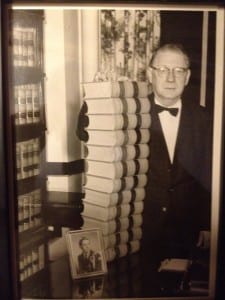
C. Lawrence Elder helped set the wheels in motion for what Tulsa family law firm Fry & Elder has become today.
The story and tradition of the Oklahoma family law firm of Fry & Elder began with C. Lawrence Elder, who helped set the wheels in motion for what the Tulsa law firm has become today – one of the most prominent divorce and child custody law firms in Oklahoma and the United States.
Born just outside of Cleveland, Oklahoma on September 5, 1909, Mr. Elder continued to grow up in Oklahoma and graduated from Catoosa High School in Rogers County, before he moved to Tulsa where he attended the University of Tulsa School of Law, graduating in 1932.
Birch Mayo gave him a job bussing tables at the Mayo Hotel coffee shop, with room and board while he went to law school. At that time, an applicant could take the Bar exam without graduating from law school and upon passing the exam, he could immediately begin practicing law. He and a fellow student, Tom Durham, decided to give it a try and both passed the exam and were admitted to the Bar in 1931. A well-known trial lawyer of the day, Mr. Flint Moss, advised him it would be a mistake not to finish law school before hanging out his “shingle.”
He began as an assistant prosecutor for the City of Tulsa and later joined Claude Rosenstein’s firm as an associate before opening his own practice some years later. Although he accepted cases involving divorce, contracts and estates, his first love was Plaintiff’s personal injury law and eventually included F.E.L.A. and Workers’ Compensation cases.
Mr. Elder was admitted to all Oklahoma courts along with the Northern and Eastern Districts of the Federal Courts. He also was admitted to the 10th Circuit Court of Appeals and the United States Supreme Court. He was a member of the Oklahoma Bar Association sitting on the Board of Governors for a number of years before his death in 1971, the Tulsa County Bar Association, Oklahoma Trial Lawyers Association, and the first and only member of the International Society of Barristers in Oklahoma for several years until the chapter grew. He also was an active member in the American Trial Lawyers Association.
He lectured at state and national conventions, speaking on the advanced principles of personal injury law, and introduced the use of blackboards and intersection diagrams as demonstrative evidence in Oklahoma.
Through the years, he mentored promising new lawyers who later went on to distinguish themselves in their own right, including James E. Poe, later president of the OBA, Gene C. Howard, later becoming President Pro Temp of the Oklahoma Senate, and others, including Robert G “Hap” Fry Jr. and his son James R. Elder, of equal impact on the practice of law in Oklahoma. Mr. Elder passed away on March 18, 1971 and is remembered by many.